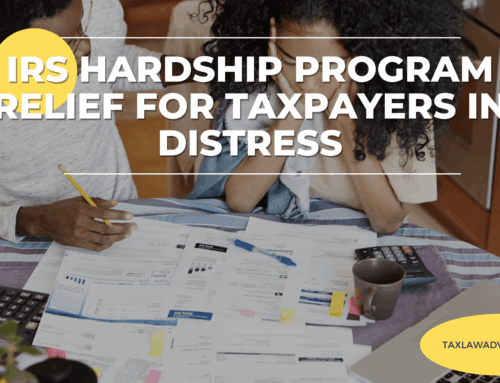Dealing with tax debt can be overwhelming, especially when you cannot pay the full amount you owe. Fortunately, the IRS provides a program known as the Offer in Compromise (OIC) that may allow you to settle your tax debt for less than what you owe. This can be a valuable lifeline for individuals and businesses facing significant financial hardship. But how does it work, who qualifies, and how can you navigate the complex application process?
In this blog, we’ll explore what an Offer in Compromise is, the eligibility requirements, the steps to apply, and how Tax Law Advocates can assist you in securing an OIC.
What is an Offer in Compromise?
An Offer in Compromise (OIC) is a program the IRS offers that allows taxpayers to settle their tax debt for less than the full amount owed. The IRS will typically only approve an OIC if they believe that the amount offered is the most they can expect to collect from you within a reasonable period of time. This is based on your ability to pay, income, expenses, and the equity in your assets.
The OIC program can be a suitable solution if:
– You can’t pay your full tax liability.
– Paying your full tax debt would create a significant financial hardship.
– The IRS believes that collecting the full amount is unlikely.
If approved, an OIC can provide much-needed relief by reducing the financial burden of your tax debt.
Eligibility Requirements for an Offer in Compromise
Before applying for an Offer in Compromise, it’s essential to ensure that you meet the IRS’s eligibility requirements. Here are the key factors that the IRS considers when determining whether you qualify for the program:
- Tax Filing Compliance: You must be current with all tax filings. This means that you have filed all required tax returns and made any estimated tax payments if required. For businesses, this includes ensuring tax deposits for the current and past two quarters are up to date.
- No Active Bankruptcy Proceedings: You cannot be in an open bankruptcy proceeding at the time of applying for an Offer in Compromise.
- Financial Circumstances: The IRS will closely evaluate your financial situation to determine if you are truly unable to pay the full tax debt. They will consider factors such as your ability to pay, income, expenses, and equity in assets.
- Offer Amount: The amount you offer must reflect the most the IRS expects to collect within a reasonable period of time. This means your offer needs to be based on what you can realistically afford rather than a random amount.
- Ongoing Compliance: After an OIC is accepted, you must continue to file and pay your taxes on time. Failure to do so could result in the IRS revoking the terms of the OIC.
To help determine your eligibility, the IRS provides an Offer in Compromise Pre-Qualifier Tool that can give you an idea of whether you meet the basic requirements.
How to Apply for an Offer in Compromise
Applying for an Offer in Compromise can be a complex and detailed process, but with the right guidance, you can improve your chances of success. Here’s a step-by-step overview of how to apply:
1. Complete the Application Package
– Form 433-A (OIC) for individuals or Form 433-B (OIC) for businesses. These forms require detailed information about your income, expenses, and assets.
– Form 656 for the specific tax debts you want to settle. If you have both personal and business tax debts, you will need to submit separate Form 656s for each.
– A $205 application fee (non-refundable), unless you meet the low-income certification guidelines.
– Your initial payment, which varies based on the payment option you choose.
2. Select a Payment Option
You have two payment options when applying for an Offer in Compromise:
– Lump Sum Cash Offer: You must submit an initial payment of 20% of the total offer amount along with your application. If the IRS accepts your offer, the remaining balance must be paid in five or fewer installments.
– Periodic Payment Offer: You must submit the initial payment with your application and continue making monthly payments until the IRS makes a decision. If accepted, you must continue making monthly payments until the offer is paid in full.
If you meet the low-income certification guidelines, you may not be required to pay the application fee or initial payment while your offer is being considered.
3. Submit Your Application
Once you’ve completed the forms and gathered all required documentation, mail the package to the IRS at the designated address listed in Form 656-B, the Offer in Compromise Booklet.
4. Await IRS Review
While the IRS reviews your offer, they may request additional information or documentation. During this time:
– Your non-refundable payments and fees are applied to your tax liability.
– The IRS may file a federal tax lien against your property.
– Collection activities are generally suspended.
– The legal collection period may be extended.
– You are not required to make payments on an existing installment agreement.
If the IRS does not make a decision within two years of receiving your offer, it is automatically accepted.
What Happens After the Offer is Accepted or Rejected?
If your Offer in Compromise is accepted, you will need to meet all the terms of the agreement, which includes filing all required tax returns and making any required payments. The IRS will release federal tax liens once the terms of the offer are fulfilled.
If your offer is rejected, you have the right to appeal within 30 days using Form 13711, Request for Appeal of Offer in Compromise. The IRS Independent Office of Appeals will then review your case.
How Tax Law Advocates Can Help
The process of applying for an Offer in Compromise can be complicated, and mistakes on the application could lead to a rejection. That’s where Tax Law Advocates comes in. Our team of federally licensed enrolled agents, tax attorneys, and accountants has the experience and expertise needed to guide you through the OIC process from start to finish.
Here’s how we can help:
– Assess Your Eligibility: We’ll evaluate your financial situation to determine whether you’re a good candidate for an Offer in Compromise and how much you should offer.
– Prepare Your Application: Our team will ensure that all forms and documentation are completed accurately and submitted on time, reducing the risk of errors.
– Negotiate with the IRS: We will act as your advocate during negotiations with the IRS, ensuring your best interests are represented.
– Post-Acceptance Support: Once your offer is accepted, we’ll continue to work with you to ensure that you remain compliant with the terms of the OIC, avoiding any future tax issues.
If you’re struggling with tax debt and think an Offer in Compromise may be the right solution for you, don’t go it alone. Contact Tax Law Advocates today to schedule a consultation. Our experienced team is ready to help you navigate the OIC process and secure the tax relief you deserve. Call us at 855-612-7777 or visit our website to learn more about how we can assist you with your tax debt.






